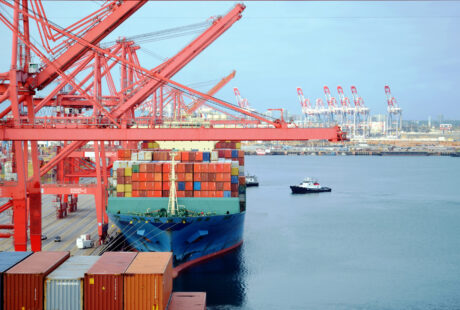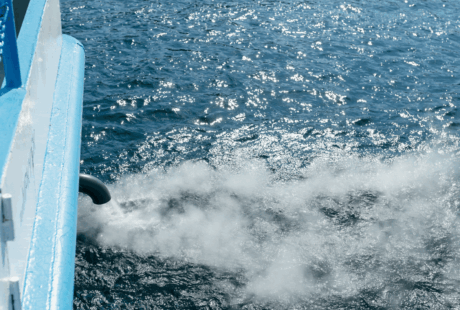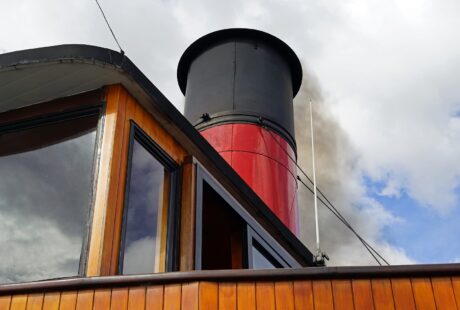As a meeting of the International Maritime Organization’s (IMO) Marine Environment Protection Committee opens today (MEPC 76), IMO member states were called on to take urgent and immediate action to protect the Arctic from the impacts of shipping emissions and pollution [1].
“I would like to stress the need for urgent action to reduce shipping’s climate warming impacts on the Arctic”, said Austin Ahmusak, Kawerak Marine Advocate, from Nome, Alaska during an address to the IMO [2].
“The disaster that I am living is a disaster that is personal to me, but it is also personal to each and everyone of us and especially to the planet. We in the Arctic are convinced that the Arctic is clearly in crisis and the change is happening rapidly, beyond comparison in human history or in our indigenous knowledge.”
“Last month, the Arctic Council released a new report concluding that the Arctic is warming three times faster than the average heating across the whole planet and we face the possibility that major portions of the cryosphere will be gone. Climate heating in the Arctic threatens the global climate and sea level rise around the world is an immediate concern for low-lying cities. A two metre sea level rise will have devastating impacts in many coastal communities and will likely put community infrastructure underwater.”
“Bolder action to protect the Arctic is urgently needed. The whole world looks to the IMO to address international shipping’s contribution to the Arctic climate crisis – in hope it will take meaningful action to reduce both emissions of greenhouse gases as well as emissions of black carbon”
“An ambitious and effective short term GHG measure consistent with the Paris Agreement temperature goals is needed, as is immediate action to cut black carbon emissions from ships in or near the Arctic.
During the meeting, which runs from 10-17 June, IMO member states are set to adopt a regulation banning the use and carriage of heavy fuel oil (HFO), which NGOs have criticised as too weak and too late – it will not be fully implemented until 2029 [3].
The meeting will also feature a proposal for a resolution to address black carbon pollution in the Arctic, while a package of “short-term measures” on greenhouse gas emissions (GHG) is set to be adopted [4,5].
“Last month, Arctic Foreign Ministers warned that the Arctic is now warming three times faster than the planet as a whole”, said Dr Sian Prior, Lead Advisor to the Clean Arctic Alliance. “When it comes to the climate, the Arctic is the planet’s early warning system – and it is clear that the Arctic is in crisis. If the Arctic is in crisis – then we are all in crisis.”
“The changing climate in the Arctic including loss of summer sea ice is already resulting in declines in wildlife populations and impacts for Indigenous communities, while the melting of Arctic glaciers and the Greenland ice sheet will contribute to sea level rise for the whole planet. During MEPC, the IMO Member States must commit to bolder action on both black carbon and greenhouse gas emissions if we are to have any hope of retaining the Arctic’s summer sea ice”, added Prior.
“The Arctic climate crisis requires urgent action to rapidly reduce both black carbon and carbon dioxide emissions from all sources including international shipping. The Clean Arctic Alliance is calling on IMO member states to support the adoption at MEPC 76 of a Black Carbon Resolution which calls for a voluntary switch to distillate or alternative, cleaner fuels while operating in or near the Arctic [6]. IMO member states must also be ambitious and hold the IMO to account by adopting strong measures to reduce CO2 emissions and keep aligned with the Paris Agreement’s 1.5oC goal.”
“In addition, the IMO and its member states must take collective responsibility for failing to put in place true protection of the Arctic, Indigenous communities and wildlife from the threat of heavy fuel oil. In its current form, the proposed ban will achieve only a minimal reduction in HFO use and carriage by ships in the Arctic in mid-2024, when it comes into effect. It will be crucial that Arctic coastal states do not resort to issuing waivers to their flagged vessels or the ban will not have the necessary impact anytime soon”, she concluded.
Other issues due to be considered during MEPC 76 include the discharge of wastewater from the use of exhaust gas cleaning systems or “scrubbers” and the impact of underwater noise [7] . Scrubbers allow the continued use of heavy fuels with a high sulphur content since the sulphur is removed from the exhaust emissions, but the wastewater from the scrubber, which also contains heavy metals and polyaromatic hydrocarbons, is dumped in the ocean. The Clean Arctic Alliance is calling for the use of scrubbers to be banned in Arctic waters.
Another issue, that of underwater noise, has not been considered by the IMO and its member states for some years and the Clean Arctic Alliance is also calling for underwater noise to be included back onto the agenda of the MEPC meeting so that consideration can be given to measures to reduce the impact.
About Black Carbon and Heavy Fuel Oil
Around the world, ships typically burn the cheapest and dirtiest fuel left over from the oil refining process – heavy fuel oil (HFO), which produces high levels of black carbon when burned. In January 2020, a new fuel standard was introduced by the IMO requiring ships’ fuels to contain no more than 0.5% sulphur leading the development and use of so-called very low sulphur fuels (VLSFOs) [8].
Although these fuel blends contain both heavy and lighter fuels, most will still be classed as HFO since they exceed the density limit used in the definition of HFO. About 7-21% of global shipping’s climate warming impacts can be attributed to black carbon – the remainder being CO2 . When emitted by ships in and near the Arctic, black carbon particles enter the lower levels of the atmosphere, where they remain for under two weeks, absorbing heat. But when it eventually comes to land on snow or ice, black carbon’s warming impact is 7 to 10 times greater, as it reduces the reflectivity (albedo) and continues to absorb heat, accelerating the Arctic melt [9].
Although shipping only contributes 2% of the black carbon in the Arctic, it has a much greater heating impact, as other sources of black carbon are higher in the atmosphere with less chance of falling on ice and snow. While most anthropogenic sources of black carbon pollution are being reduced in the Arctic, shipping emissions of black carbon have risen 8% globally in the past decade, and in the Arctic by 85% between 2015 and 2019 alone [10].
With climate warming driving the ongoing loss of multi-season Arctic sea ice, the region is opening up to more shipping traffic; between 2013 and 2019 data published by the Arctic Council showed a 25% increase in shipping traffic and a 75% increase in the total distance sailed in the Arctic, we can expect that further increases in black carbon emissions from shipping will only further contribute to an already accelerating feedback loop [11,12].
In November 2020, the International Maritime Organization (IMO), the UN body which governs shipping, approved a ban on the use and carriage of HFO in the Arctic – a ban that is set to be adopted this June. Although environmental and Indigenous groups had fought for years for the Arctic to be free of HFO, this ban set to be agreed in a few months contains serious loopholes which will mean minimal reductions in the use and carriage of HFO in 2024 when implemented. Meanwhile current growth in Arctic shipping is likely to lead to an increase in HFO use and carriage in the Arctic between now and mid-2024 when the ban takes effect and further growth by mid-2029, when the loopholes will finally be closed. Under this regime, black carbon emissions are likely, for now, to continue to increase in the Arctic [13].
Notes:
[1] IMO Media information – MEPC 76 preview
https://www.imo.org/en/MediaCentre/IMOMediaAccreditation/Pages/MEPC-76-preview.aspx
[2] Opening Statement at MEPC 76 by Austin Ahmusak, Kawerak Marine Advocate, from Nome, Alaska
https://www.hfofreearctic.org/en/2021/06/10/opening-arctic-climate-crisis-statement-mepc76-austin-ahmusak/
[3] MEPC 76/3/10 Comments on the draft amendments to MARPOL Annex I Submitted by FOEI, Greenpeace International, WWF, Pacific Environment and the Clean Shipping Coalition. 21 April 2021
https://imoarcticsummit.org/publications/imo-papers/mepc-76/mepc-76-3-10-comments-on-the-draft-amendments-to-marpol-annex-i/
UN Shipping Agency Slammed for Fiddling While Arctic Melts
https://www.hfofreearctic.org/en/2021/03/26/un-shipping-agency-slammed-for-fiddling-while-arctic-melts/
[4] MEPC 76/9/10 Comments on the outcome of PPR 8. Submitted by Greenpeace International, WWF, Pacific Environment and CSC. 21 April 2021. https://imoarcticsummit.org/publications/imo-papers/mepc-76/mepc-76-9-10-comments-on-the-outcome-of-ppr-8/
[5] ISWG-GHG 8/WP.1/Rev.1 Draft report of the eighth meeting of the Intersessional Working Group on Reduction of GHG Emissions from Ships (ISWG-GHG 8) 1 June 2021.
[6] MEPC 76-9-10 – Comments on the outcome of PPR 8.Submitted by Greenpeace International, WWF, Pacific Environment and CSC.
https://imoarcticsummit.org/publications/imo-papers/mepc-76/mepc-76-9-10-comments-on-the-outcome-of-ppr-8/
[7] MEPC 76-9-8 – Comments on documents MEPC 76/9/1 and MEPC 76/9/2. Submitted by FOEI, Greenpeace International, WWF, Pacific Environment and CSC1
https://imoarcticsummit.org/publications/imo-papers/mepc-76/mepc-76-9-8-comments-on-documents-mepc-7691-and-mepc-7692/
[8] Global limit on sulphur in ships’ fuel oil reduced from 01 January 2020.
https://www.imo.org/en/MediaCentre/PressBriefings/Pages/34-IMO-2020-sulphur-limit-.aspx
[9] https://www.hfofreearctic.org/wp-content/uploads/2021/05/ICCT_BC_fuel-switch.pdf
International Council on Clean Transportation, Greenhouse gas emissions from global shipping, 2013–2015
https://theicct.org/publications/GHG-emissions-global-shipping-2013-2015
White paper: The International Maritime Organization’s proposed Arctic heavy fuel oil ban: Likely implications and opportunities for improvement, International Council on Clean Transportation, 3 September 2020
https://theicct.org/publications/analysis-HFO-ban-IMO-2020
6th workshop on marine black carbon emissions, International Council on Clean Transportation, Helsinki, 18 September 2019
https://theicct.org/events/6th-workshop-marine-black-carbon-emissions
[10]IMO Submission: Consideration Of The Impact On The Arctic Of Emissions Of Black Carbon From International Shipping: Greenhouse gas emissions from global shipping 2013-2015 https://www.hfofreearctic.org/en/2017/12/01/greenhouse-gas-emissions-from-global-shipping-2013-2015/
[11] The IMO’s proposed Arctic heavy fuel oil (HFO) ban, ICCT Fact Sheet, September 2020.
https://theicct.org/publications/analysis-HFO-ban-IMO-2020
The International Council on Clean Transportation White Paper shows that in the last four years, there has been a 19% increase in the carriage of HFO by ships operating in the Arctic and a 75% increase in HFO use in the Arctic. This has resulted in a 72% increase in black carbon emissions from ships burning HFO and a 85% increase when all shipping black carbon emissions are considered.
Comer, B., 2021. Expected black carbon emissions reductions from fuel switching. Clean Arctic Alliance PPR 8 Side Event. 22 March, 2021
https://www.hfofreearctic.org/en/2021/03/11/webinar-switching-fuel-how-to-cut-black-carbon-emissions-from-arctic-shipping/
[11] Flanner, M. G. (2013), Arctic climate sensitivity to local black carbon, J. Geophys. Res. Atmos., 118, 1840– 1851, doi:10.1002/jgrd.50176.
[12] The IMO’s proposed Arctic heavy fuel oil (HFO) ban, ICCT Fact Sheet, September 2020.
https://theicct.org/publications/analysis-HFO-ban-IMO-2020
The International Council on Clean Transportation White Paper shows that in the last four years, there has been a 19% increase in the carriage of HFO by ships operating in the Arctic and a 75% increase in HFO use in the Arctic. This has resulted in a 72% increase in black carbon emissions from ships burning HFO and a 85% increase when all shipping black carbon emissions are considered.
Comer, B., 2021. Expected black carbon emissions reductions from fuel switching. Clean Arctic Alliance PPR 8 Side Event. 22 March, 2021.
https://www.hfofreearctic.org/en/2021/03/11/webinar-switching-fuel-how-to-cut-black-carbon-emissions-from-arctic-shipping/
[13] Arctic Council First Arctic Shipping Status Report from PAME Working Group highlights increase in Arctic shipping traffic, 14 April 2020
https://www.google.com/url?q=https://arctic-council.org/en/news/first-arctic-shipping-status-report-increase-shipping-traffic/
About the Clean Arctic Alliance
The following not-for-profit organisations form the Clean Arctic Alliance, which is committed to a ban on HFO as marine fuel in the Arctic:
90 North Unit, The Altai Project, Alaska Wilderness League, Bellona, Clean Air Task Force, Green Transition Denmark, Ecology and Development Foundation ECODES, Environmental Investigation Agency, European Climate Foundation, Friends of the Earth US, Global Choices, Greenpeace, Iceland Nature Conservation Association, International Cryosphere Climate Initiative, Nature And Biodiversity Conservation Union, Ocean Conservancy, Pacific Environment, Seas At Risk, Surfrider Foundation Europe, Stand.Earth, Transport & Environment and WWF.
Posted on: 10 June 2021



